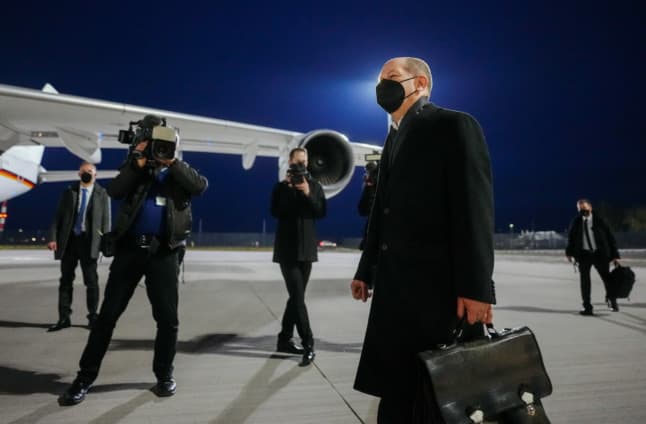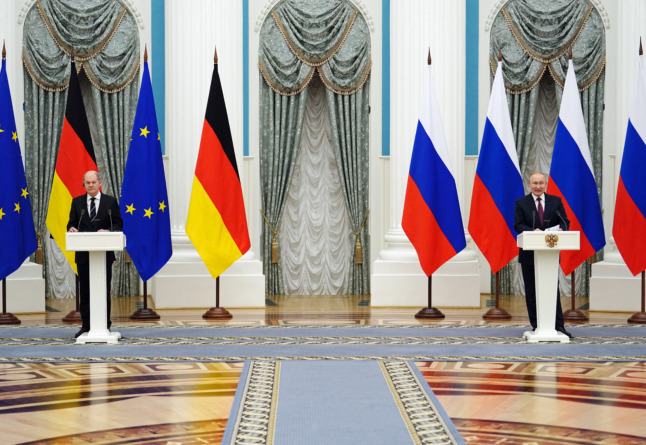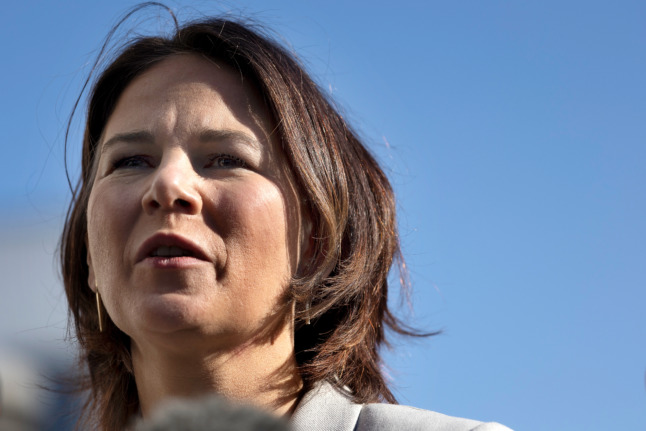German chancellor Scholz meets Putin as Ukraine's fate in the balance

German Chancellor Olaf Scholz visited Moscow Tuesday in search of a diplomatic solution to avoid a war in Ukraine as the West and Russia signalled tentative hopes of an easing in the tense standoff.
His talks with Vladimir Putin are the latest in an intense diplomatic scramble to dissuade the Russian leader from attacking his ex-Soviet neighbour Ukraine.
Putin said on Tuesday he was ready to continue working with the West on security issues to de-escalate tensions over Ukraine.
"We are ready to work further together. We are ready to go down the negotiations track," Putin told a press conference following talks in Moscow with German Chancellor Scholz.

German Chancellor Olaf Scholz at a joint press conference with Russian President Vladimir Putin on Tuesday. Photo: picture alliance/dpa | Kay Nietfeld
Putin said that "of course" Russia does not want war. But it "cannot turn a blind eye" to how Washington and NATO "freely interpret" the principle of the indivisibility of security -- that no country should strengthen its security at the expense of others.
Ahead of Tuesday's talks, German Foreign Minister Annalena Baerbock warned that "the situation is particularly dangerous and can escalate at any moment".
READ ALSO: Germany and France to resume 'difficult' Ukraine talks in March
"The responsibility for de-escalation is clearly with Russia, and it is for Moscow to withdraw its troops," she said in a statement, adding that "we must use all opportunities for dialogue in order to reach a peaceful solution".

German Foreign Minister Annalena Baerbock. Photo: picture alliance/dpa | Carsten Koall
Russia has amassed more than 100,000 troops on the Ukrainian border.
Earlier on Tuesday, the Kremlin confirmed a pullback of some forces from Ukraine's borders but said the move was planned and stressed Russia would continue to move troops across the country as it saw fit.
The Russian leader and his top aides have consistently argued that the current crisis is the result of the United States and western Europe ignoring Moscow's legitimate security concerns.
Russia, which denies any plan to invade Ukraine, already controls the Crimea territory seized in 2014 and supports separatist forces controlling the Donbas region in the east.
The Kremlin insists NATO must give assurances Ukraine will never be admitted as a member and withdraw from eastern European countries already in
the alliance, effectively carving Europe into spheres of influence. The United States and its European allies reject the demands.
UN Secretary-General Antonio Guterres spoke with the foreign ministers of Russia and Ukraine on Monday to express his serious concern over the
heightened tensions and insisted "there is no alternative to diplomacy".
READ ALSO: OPINION: Germany is in a muddle over Russia – and it only has itself to blame
Pentagon spokesman John Kirby said US defence officials still did not believe Moscow had made a final decision on whether to invade Ukraine.
Alarm has also been fuelled by recent Russian military exercises, including with Belarus, where Washington said Moscow had dispatched 30,000 troops for more than a week of drills.
Russian Defence Minister Sergei Shoigu told Putin that some of the drills were "ending" and more would end "in the near future", signalling a possible easing of the crisis.
Ukrainian leader Volodymyr Zelensky meanwhile declared Wednesday -- the day US officials warn might mark the start of a feared Russian invasion --
national "Unity Day".
Digging trenches
Ahead of his trip to Moscow, Scholz visited Kyiv on Monday, vowing that Berlin and its Western allies would maintain support for Ukraine's security and independence and urging Russia to take up "offers of dialogue".
Germany plays a central role in efforts to mediate in eastern Ukraine, where a gruelling conflict with Russian-backed separatists has claimed more than 14,000 lives.
READ ALSO: Scholz sees ‘progress’ in diplomatic efforts to ease Ukraine crisis
But Berlin's close business relations with Moscow and heavy reliance on Russian natural gas imports have been a source of lingering concern for Kyiv's pro-Western leaders and Biden's team.
Scholz has hedged against unequivocally backing Biden's pledge to "bring an end" to Russia's new Nord Stream 2 gas link to Germany.
While waiting for diplomacy to bear fruit, near the front line separating Kyiv-held territory from areas under the control of Moscow-backed insurgents in the east, underprivileged children in the care of church groups were helping with war preparations.
"We are digging trenches that Ukrainian soldiers could quickly jump into and defend in case the Russians attack," Mykhailo Anopa, 15, told AFP.
In Moscow, Russians showed no appetite for war.
"People in the West do not understand that we are one people," Pavel Kuleshov, a 65-year-old pensioner, told AFP, referring to Russians and Ukrainians. "Nobody wants a civil war."
A growing number of Western countries are withdrawing staff from their Kyiv embassies and urging their citizens to leave Ukraine immediately, while Washington moved its mission west to Lviv.
By Anna SMOLCHENKO
Comments
See Also
His talks with Vladimir Putin are the latest in an intense diplomatic scramble to dissuade the Russian leader from attacking his ex-Soviet neighbour Ukraine.
Putin said on Tuesday he was ready to continue working with the West on security issues to de-escalate tensions over Ukraine.
"We are ready to work further together. We are ready to go down the negotiations track," Putin told a press conference following talks in Moscow with German Chancellor Scholz.

Putin said that "of course" Russia does not want war. But it "cannot turn a blind eye" to how Washington and NATO "freely interpret" the principle of the indivisibility of security -- that no country should strengthen its security at the expense of others.
Ahead of Tuesday's talks, German Foreign Minister Annalena Baerbock warned that "the situation is particularly dangerous and can escalate at any moment".
READ ALSO: Germany and France to resume 'difficult' Ukraine talks in March
"The responsibility for de-escalation is clearly with Russia, and it is for Moscow to withdraw its troops," she said in a statement, adding that "we must use all opportunities for dialogue in order to reach a peaceful solution".

Russia has amassed more than 100,000 troops on the Ukrainian border.
Earlier on Tuesday, the Kremlin confirmed a pullback of some forces from Ukraine's borders but said the move was planned and stressed Russia would continue to move troops across the country as it saw fit.
The Russian leader and his top aides have consistently argued that the current crisis is the result of the United States and western Europe ignoring Moscow's legitimate security concerns.
Russia, which denies any plan to invade Ukraine, already controls the Crimea territory seized in 2014 and supports separatist forces controlling the Donbas region in the east.
The Kremlin insists NATO must give assurances Ukraine will never be admitted as a member and withdraw from eastern European countries already in
the alliance, effectively carving Europe into spheres of influence. The United States and its European allies reject the demands.
UN Secretary-General Antonio Guterres spoke with the foreign ministers of Russia and Ukraine on Monday to express his serious concern over the
heightened tensions and insisted "there is no alternative to diplomacy".
READ ALSO: OPINION: Germany is in a muddle over Russia – and it only has itself to blame
Pentagon spokesman John Kirby said US defence officials still did not believe Moscow had made a final decision on whether to invade Ukraine.
Alarm has also been fuelled by recent Russian military exercises, including with Belarus, where Washington said Moscow had dispatched 30,000 troops for more than a week of drills.
Russian Defence Minister Sergei Shoigu told Putin that some of the drills were "ending" and more would end "in the near future", signalling a possible easing of the crisis.
Ukrainian leader Volodymyr Zelensky meanwhile declared Wednesday -- the day US officials warn might mark the start of a feared Russian invasion --
national "Unity Day".
Digging trenches
Ahead of his trip to Moscow, Scholz visited Kyiv on Monday, vowing that Berlin and its Western allies would maintain support for Ukraine's security and independence and urging Russia to take up "offers of dialogue".
Germany plays a central role in efforts to mediate in eastern Ukraine, where a gruelling conflict with Russian-backed separatists has claimed more than 14,000 lives.
READ ALSO: Scholz sees ‘progress’ in diplomatic efforts to ease Ukraine crisis
But Berlin's close business relations with Moscow and heavy reliance on Russian natural gas imports have been a source of lingering concern for Kyiv's pro-Western leaders and Biden's team.
Scholz has hedged against unequivocally backing Biden's pledge to "bring an end" to Russia's new Nord Stream 2 gas link to Germany.
While waiting for diplomacy to bear fruit, near the front line separating Kyiv-held territory from areas under the control of Moscow-backed insurgents in the east, underprivileged children in the care of church groups were helping with war preparations.
"We are digging trenches that Ukrainian soldiers could quickly jump into and defend in case the Russians attack," Mykhailo Anopa, 15, told AFP.
In Moscow, Russians showed no appetite for war.
"People in the West do not understand that we are one people," Pavel Kuleshov, a 65-year-old pensioner, told AFP, referring to Russians and Ukrainians. "Nobody wants a civil war."
A growing number of Western countries are withdrawing staff from their Kyiv embassies and urging their citizens to leave Ukraine immediately, while Washington moved its mission west to Lviv.
By Anna SMOLCHENKO
Join the conversation in our comments section below. Share your own views and experience and if you have a question or suggestion for our journalists then email us at [email protected].
Please keep comments civil, constructive and on topic – and make sure to read our terms of use before getting involved.
Please log in here to leave a comment.